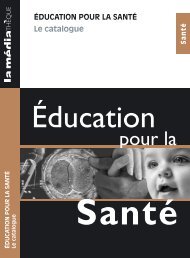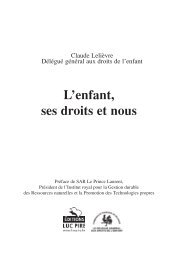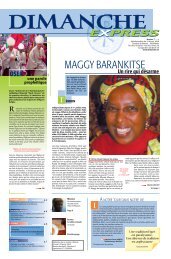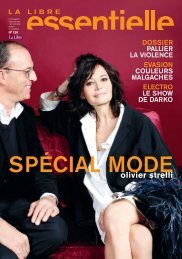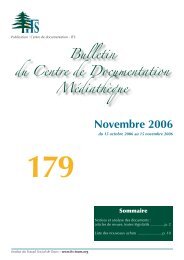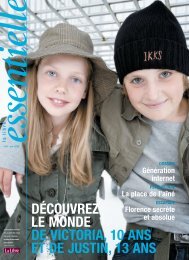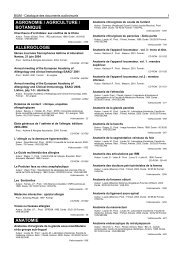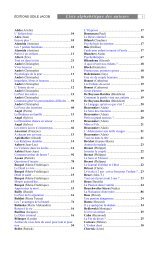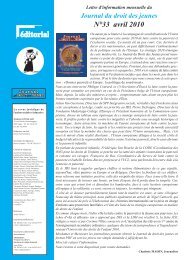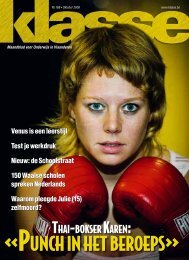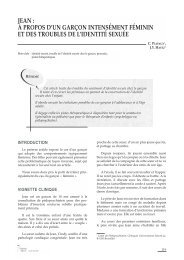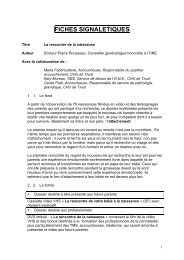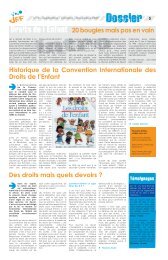DOC 51 0664/008 DOC 51 0664/008 - Site de Jean-Yves Hayez.
DOC 51 0664/008 DOC 51 0664/008 - Site de Jean-Yves Hayez.
DOC 51 0664/008 DOC 51 0664/008 - Site de Jean-Yves Hayez.
Create successful ePaper yourself
Turn your PDF publications into a flip-book with our unique Google optimized e-Paper software.
6 <strong>DOC</strong> <strong>51</strong> <strong>0664</strong>/<strong>008</strong><br />
bénéficient d’une protection juridique à part entière?<br />
Selon la fédération, il faut distinguer trois groupes d’enfants<br />
dont la situation doit être réglementée légalement.<br />
Le premier groupe est composé <strong>de</strong>s enfants qui sont<br />
nés dans un couple <strong>de</strong> lesbiennes après une insémination<br />
artificielle avec le sperme d’un donneur anonyme.<br />
Dans ce cas, l’autorisation <strong>de</strong> l’adoption par <strong>de</strong>s couples<br />
homosexuels constitue la solution, la parentalité<br />
sociale ne constituant pas en l’occurrence une bonne<br />
solution, selon la fédération. Le <strong>de</strong>uxième groupe englobe<br />
les enfants qui ont été adoptés par un homme ou<br />
une femme homosexuel(le) par le bais <strong>de</strong> l’adoption<br />
monoparentale et qui grandissent dans une famille<br />
holebi. Dans ce cas également, la Fédération plai<strong>de</strong> en<br />
faveur <strong>de</strong> l’autorisation <strong>de</strong> l’adoption, et pas seulement<br />
<strong>de</strong> l’adoption nationale. La conclusion d’accords bilatéraux<br />
doit permettre l’adoption internationale. Le troisième<br />
groupe concerne les enfants qui grandissent dans <strong>de</strong>s<br />
familles holebi, mais qui sont nés d’une relation hétérosexuelle<br />
antérieure. Il s’agit en l’occurrence <strong>de</strong>s familles<br />
recomposées, tant holebi qu’hétérosexuelles. Pour cette<br />
catégorie, la fédération estime que la parentalité sociale<br />
peut constituer une solution. Elle considère qu’il<br />
appartient au législateur d’offrir une protection et une<br />
sécurité juridiques maximales à tous les enfants.<br />
Le <strong>de</strong>uxième orateur était M. Benoit Vanparijs, <strong>de</strong> la<br />
Fédération <strong>de</strong>s Associations Gayes et lesbiennes en<br />
Belgique francophone. Cette organisation se fon<strong>de</strong> sur<br />
les revendications formulées lors <strong>de</strong> la Lesbian and Gay<br />
Pri<strong>de</strong> 2005 en vue <strong>de</strong> la reconnaissance <strong>de</strong> droits égaux<br />
aux enfants élevés par <strong>de</strong>s couples homosexuels. La<br />
possibilité pour ces couples d’avoir, d’adopter et d’élever<br />
ensemble <strong>de</strong>s enfants doit être consacrée dans une<br />
loi. Le lien entre le parent social et les enfants qui sont<br />
élevés par <strong>de</strong>s couples homosexuels et ne peuvent pas<br />
faire l’objet d’une adoption doit également être inscrit<br />
dans un cadre juridique. Il convient <strong>de</strong> régler différents<br />
aspects: nom, droit successoral, pension alimentaire,<br />
soins <strong>de</strong> santé, etc. La fédération a attiré l’attention <strong>de</strong>s<br />
membres <strong>de</strong> la commission sur certaines objections<br />
opposées à l’adoption, pour les réfuter ensuite. La fédération<br />
<strong>de</strong>man<strong>de</strong> que l’on se penche d’abord sur les<br />
situations humaines existantes et sur le droit <strong>de</strong>s enfants<br />
à l’existence.<br />
M. Ivo Moelans a été entendu au nom <strong>de</strong> la Homoliga.<br />
Celle-ci estime qu’il y a lieu <strong>de</strong> se fon<strong>de</strong>r en premier lieu<br />
sur le principe <strong>de</strong> non-discrimination et, dans le cas <strong>de</strong><br />
l’adoption, sur l’intérêt <strong>de</strong> l’enfant. La Homoliga est en<br />
faveur d’une ouverture totale, sans restrictions, <strong>de</strong> toutes<br />
les formes d’adoption aux homosexuels et aux lesbiennes.<br />
Elle invoque à cet égard les arguments suivants:<br />
les candidats adoptants sont toujours soumis à<br />
une enquête approfondie; l’évolution <strong>de</strong>s enfants éle-<br />
bescherming krijgen? Volgens <strong>de</strong> Holebife<strong>de</strong>ratie zijn<br />
er drie groepen kin<strong>de</strong>ren waarvoor een wettelijke regeling<br />
nodig is. De eerste groep kin<strong>de</strong>ren zijn <strong>de</strong> kin<strong>de</strong>ren<br />
die geboren wer<strong>de</strong>n bij een lesbisch koppel na kunstmatige<br />
inseminatie met anoniem donorsperma. Openstelling<br />
van <strong>de</strong> adoptie tot koppels van het gelijke geslacht<br />
is hier <strong>de</strong> oplossing, het zorgou<strong>de</strong>rschap biedt<br />
hier volgens <strong>de</strong> Fe<strong>de</strong>ratie geen goe<strong>de</strong> oplossing. De<br />
twee<strong>de</strong> groep kin<strong>de</strong>ren zijn <strong>de</strong> kin<strong>de</strong>ren die geadopteerd<br />
wor<strong>de</strong>n door een homoseksuele man of een lesbische<br />
vrouw via een éénou<strong>de</strong>radoptie en die opgroeien in een<br />
holebi-gezin. Ook hier pleit <strong>de</strong> fe<strong>de</strong>ratie voor <strong>de</strong> openstelling<br />
van <strong>de</strong> adoptie en dit niet enkel beperkt tot <strong>de</strong><br />
binnenlandse adoptie. Interlan<strong>de</strong>lijke adoptie moet mogelijk<br />
zijn via bilaterale akkoor<strong>de</strong>n. De <strong>de</strong>r<strong>de</strong> groep kin<strong>de</strong>ren<br />
betreft <strong>de</strong> kin<strong>de</strong>ren die opgroeien in holebigezinnen<br />
maar afkomstig zijn uit een vorige heterorelatie.<br />
Het betreft hier <strong>de</strong> nieuw samengestel<strong>de</strong> gezinnen, zowel<br />
holebi als hetero. Hier ziet <strong>de</strong> Holebife<strong>de</strong>ratie een<br />
oplossing in het zorgou<strong>de</strong>rschap. Zij vin<strong>de</strong>n het <strong>de</strong> taak<br />
van <strong>de</strong> wetgever om voor alle kin<strong>de</strong>ren een maximale<br />
juridische bescherming en zekerheid te bie<strong>de</strong>n.<br />
De twee<strong>de</strong> spreker was <strong>de</strong> heer Benoit Vanparijs van<br />
<strong>de</strong> Fédération <strong>de</strong>s Associations Gayes et lesbiennes en<br />
Belgique francophone. Deze organisatie verwijst naar<br />
<strong>de</strong> eisenbun<strong>de</strong>l van <strong>de</strong> Lesbian and Gay Pri<strong>de</strong> 2005<br />
waar gepleit wordt voor gelijke rechten voor <strong>de</strong> kin<strong>de</strong>ren<br />
in een gezin met holebi-ou<strong>de</strong>rs. Het samen krijgen,<br />
adopteren en opvoe<strong>de</strong>n van kin<strong>de</strong>ren door holebiparen<br />
moet bij wet wor<strong>de</strong>n erkend. Voor kin<strong>de</strong>ren die opgroeien<br />
in holebigezinnen en die niet geadopteerd kunnen wor<strong>de</strong>n,<br />
moet er een juridische omka<strong>de</strong>ring komen van <strong>de</strong><br />
band tussen kind en zorgou<strong>de</strong>r. Die omka<strong>de</strong>ring moet<br />
er komen op het vlak van <strong>de</strong> naamgeving, het erfrecht,<br />
<strong>de</strong> alimentatievergoeding, <strong>de</strong> gezondheidszorg en an<strong>de</strong>re.<br />
De fédération heeft <strong>de</strong> commissiele<strong>de</strong>n op enkele<br />
bezwaren geatten<strong>de</strong>erd die tegen adoptie wor<strong>de</strong>n ingeroepen<br />
om ze daarna te weerleggen. De fédération<br />
vraagt dat men het in eerste instantie heeft over <strong>de</strong> bestaan<strong>de</strong><br />
menselijke situaties en over het recht van <strong>de</strong><br />
kin<strong>de</strong>ren op hun bestaan.<br />
Namens <strong>de</strong> Homoliga is <strong>de</strong> heer Ivo Moelans komen<br />
spreken. Uitgangspunt voor hen is het non-discriminatiebeginsel<br />
en ingeval van adoptie, het belang van het kind.<br />
De Homoliga is voorstan<strong>de</strong>r van <strong>de</strong> volledige, onverkorte<br />
openstelling van alle adoptiemogelijkhe<strong>de</strong>n voor<br />
homo’s en lesbiennes. Als argumenten pro schuiven zij<br />
naar voren: <strong>de</strong> grondige screening van <strong>de</strong> kandidaatadoptanten,<br />
geen significante verschillen in evolutie van<br />
kin<strong>de</strong>ren opgevoed in een homogezin en <strong>de</strong> realiteit dat<br />
CHAMBRE 4e SESSION DE LA <strong>51</strong>e LÉGISLATURE 2005 2006<br />
KAMER<br />
4e ZITTING VAN DE <strong>51</strong>e ZITTINGSPERIODE



